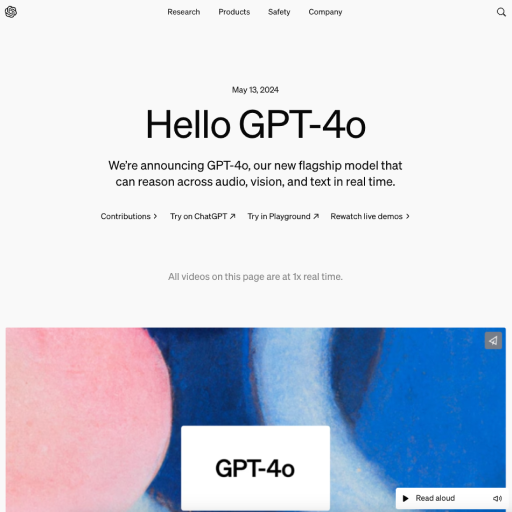GPT-4o
We’re announcing GPT-4o, our new flagship model that can reason across audio, vision, and text in real time.

**Frequently Asked Questions (FAQ) about GPT-4o**
**1. What is GPT-4o and how does it differ from GPT-4?**
- GPT-4o is an enhanced version of GPT-4, optimized for faster response times and improved handling of multimodal inputs including text, vision, and audio. Unlike GPT-4, GPT-4o can process and generate outputs across all three modalities, making it more versatile and natural in human-computer interactions.
**2. How fast is GPT-4o in responding to audio inputs?**
- GPT-4o can respond to audio inputs in as little as 232 milliseconds, with an average response time of 320 milliseconds, which is similar to human response time in a conversation.
**3. What improvements does GPT-4o have over previous models in handling different languages?**
- GPT-4o matches GPT-4 Turbo's performance on text in English and code, with significant improvements on text in non-English languages. It offers better multilingual capabilities, ensuring high-quality processing across a broader range of languages.
**4. How does GPT-4o handle voice interactions compared to previous models?**
- Prior to GPT-4o, voice interactions were managed through a pipeline of separate models, leading to higher latencies and loss of contextual information. GPT-4o integrates all inputs and outputs into a single model, allowing for direct processing and generation of voice inputs and outputs, including emotional tones, laughter, and singing.
**5. What safety measures are built into GPT-4o?**
- GPT-4o has built-in safety measures across all modalities, including filtering training data and refining model behavior through post-training. New safety systems provide guardrails for voice outputs. Extensive testing and external red teaming have been conducted to identify and mitigate risks associated with the model’s capabilities.
**6. What are the capabilities of GPT-4o in terms of text, vision, and audio?**
- GPT-4o excels in text, vision, and audio understanding. It matches GPT-4 Turbo in text and code processing, offers improved vision analysis, and provides advanced audio processing, including real-time speech recognition and emotional tone interpretation.
**7. How can users access GPT-4o?**
- Users can access GPT-4o through the ChatGPT app and API. It is available to both free and Plus users, with Plus users benefiting from higher message limits. Developers can integrate GPT-4o into their applications using the API, with support for text and vision available now and audio capabilities to be launched soon.
**8. What are the benefits for paid subscribers compared to free users?**
- Paid subscribers enjoy enhanced capabilities, including higher usage limits, priority access to new features, and premium customer support. This tier is ideal for businesses and users requiring intensive use of the AI for commercial or research purposes.
**9. What new applications and improvements does GPT-4o bring to the table?**
- GPT-4o enables more natural and intuitive human-computer interactions by seamlessly integrating text, vision, and audio inputs and outputs. Its advanced multimodal capabilities support a wide range of applications, from interactive educational tools to sophisticated business analytics.
**10. How is GPT-4o being rolled out?**
- GPT-4o’s text and image capabilities are starting to roll out in ChatGPT, available to free tier users and Plus users with higher message limits. A new version of Voice Mode with GPT-4o is expected to roll out in alpha for ChatGPT Plus users soon. The API for developers is available now, with audio and video capabilities to be launched to a select group of partners in the coming weeks.
**11. What makes GPT-4o more efficient and cost-effective?**
- GPT-4o is designed to be twice as fast and half the price of GPT-4 Turbo. It incorporates efficiency improvements at every layer of the stack, making it more affordable and faster for developers to use in their applications.
**12. What are the security and privacy measures in place for GPT-4o?**
- GPT-4o adheres to OpenAI’s rigorous security standards, ensuring all data processed is handled securely. Regular updates and patches enhance its security framework. The model has undergone extensive safety evaluations and external red teaming to ensure it meets high standards of safety and reliability.
**13. How does GPT-4o handle real-time voice interactions?**
- GPT-4o processes spoken input in real-time, enabling natural and fluid conversations with the AI. It can understand and respond to emotional tones, making interactions more empathetic and aligned with user sentiments.
**14. Can GPT-4o be used for educational purposes?**
- Absolutely. GPT-4o can assist with a wide range of educational tasks, from providing detailed explanations of complex subjects to helping with language learning and exam preparation.
**15. What system requirements are needed to integrate GPT-4o?**
- GPT-4o can be integrated into existing systems using API calls. Any modern system capable of HTTPS requests can support integration with GPT-4o, with specific requirements depending on the scale of use.
**16. Can I use GPT-4o for commercial purposes?**
- Yes, GPT-4o is designed to be versatile across various industries, including healthcare, finance, and customer service, making it suitable for commercial use.
**17. How does GPT-4o improve the user experience for developers?**
- Developers can access GPT-4o through the API, which is more cost-effective and faster than previous models. This allows for the integration of advanced AI capabilities into applications, supporting a new wave of multimodal AI applications and integrations.
Больше статей и новостей Tap4 AI Tools Directory
Дополнительные статьи и новости о Tap4 AI Tools Directory.